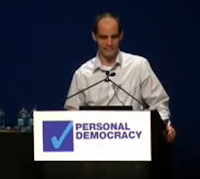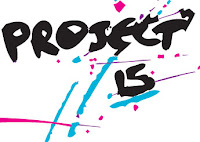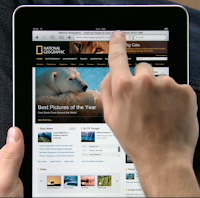
This post is to address several issues that arose from the assignment to watch
The Machine Is Changing Us.OneSometimes learning is not instantaneous. It takes work. Many of you reported that when you saw that
The Machine is Changing Us was almost 35 minutes long you knew you "would be bored." I often commented in response that I wondered how you would handle an hour long video assigned for Week 8. Learning often takes time. You have 9 hours a week set aside for EDM310. Use it!
TwoLook for clues about the speaker and the forum (or the teacher, the author, the assignment). All of these can help you understand more clearly.
The speaker: Michael Wesch, a cultural anthropologist who teaches at Kansas State University and who explores "the effects of new media and culture." A simple Google search was all that was needed to give you a great deal of information about the speaker.
The context: A speech before
The Personal Democracy Forum. One Google click takes us to the Personal Democracy Forum site which immediately reveals to the visitor that this is an organization that is attempting to personalize democratic politics by increasing participation through the use of technology. This took no more than 10 minutes of a 9 hour week. But if 35 minutes bores you, 45 minutes must indeed be scary.
Three What do we have? A specialist in the impact that media is having on society talking to people who want to use the new media and new technologies to affect the political system. We can expect the speaker to cast his expert knowledge into a form that will be interesting and useful to this particular audience. How does Professor Wesch do that?
First he summarizes two books that are certainly known to his audience:
Brave New World by Aldous Huxley and
1984 by George Orwell. Sparingly he compares the books in a way that is useful to the central thesis of his speech. Having captured the audience's attention he draws on two other authors who made important contributions to the study of the way media shapes our life: Marshall McLuhan and Neil Postman. Again, two quick Google searches and 10 minutes on each person would help you understand these very important contributors to our understandings of how media impacts our culture. Postman is especially important to Professor Wesch's speech. Dr. Wesch gives a 60 second summary of Postman's book
Amusing Ourselves to Death. One student remarked that watching the video was difficult because he had to constantly stop, rewind, play it again. So did I. And often that is the case. Again the lesson: learning sometimes takes time. Now we are up to an hour. Oh my!
Four Professor Wesch takes Postman's thesis that media turned the public away from an interest in important things, i.e. political questions of great importance to mankind, and emphasized only amusements. Dr. Wesch elaborates on this by recounting a history of "whatever" starring in part The Simpsons and by reporting on the research he and his students have been doing on YouTube with special emphasis on "Charlie". All of this is done to entertain as well as to inform. Remember he is getting paid not only to deliver a speech but also, ironically, to
entertain.Side Point: Dr. Wesch mentions that the YouTube research is a project he does with his classes. Project based education. Not entertaining lectures, but actual research involving collaborative thinking!
Five Throughout Dr. Wesch has been offering support for the argument that the media is causing political mayhem by diverting the populace from real issues to trivial entertainments. And yet his audience is trying to use the new media to re-involve the population in political action by taking advantage of the new media. Does Dr. Wesch want to leave them with the feeling that their mission is hopeless? Of course not. So he uses the Hugs You Tube series and the "Palm Messages" of unity and love to raise the possibility that YouTube can bring people together, can encourage activity, that there is a positive spin that can be put on the gloomy commentaries about media and political action. I would add that there is even more evidence to support this argument after the last presidential election.
Concluding ThoughtsThere are several versions of this video that have been made. One is about 5 minutes long. Because I feared the short attention span of EDM310 students (are they really going to be teachers?), I have used that version in the past. The optimism Dr. Wesch offered in this version is severely muted in the shorter versions. I was in an optimistic mood when I chose this version for the Fall term. I thought EDM310 students could handle a 35 minute video plus 20-30 minutes of additional research and rewinding of the tape. Was I correct or not? And has this commentary helped you understand the message Dr. Wesch was delivering?
A Note of ImportanceBlog posts are ephemeral. They can be altered, or even disappear. Historians, librarians and scholars of all types feel uncomfortable with the replacement of records. So I am notifying them, and you, that I modified this post approximately 24 hours after I wrote it by adding the reference to Huxley and Orwell and by including the Dr. Wesch's use of the "Palm Messages" in support of his argument. It is appropriate to note changes of this type if you make similar changes on your blog posts.








 All SMART Board software is now web based.
All SMART Board software is now web based.










